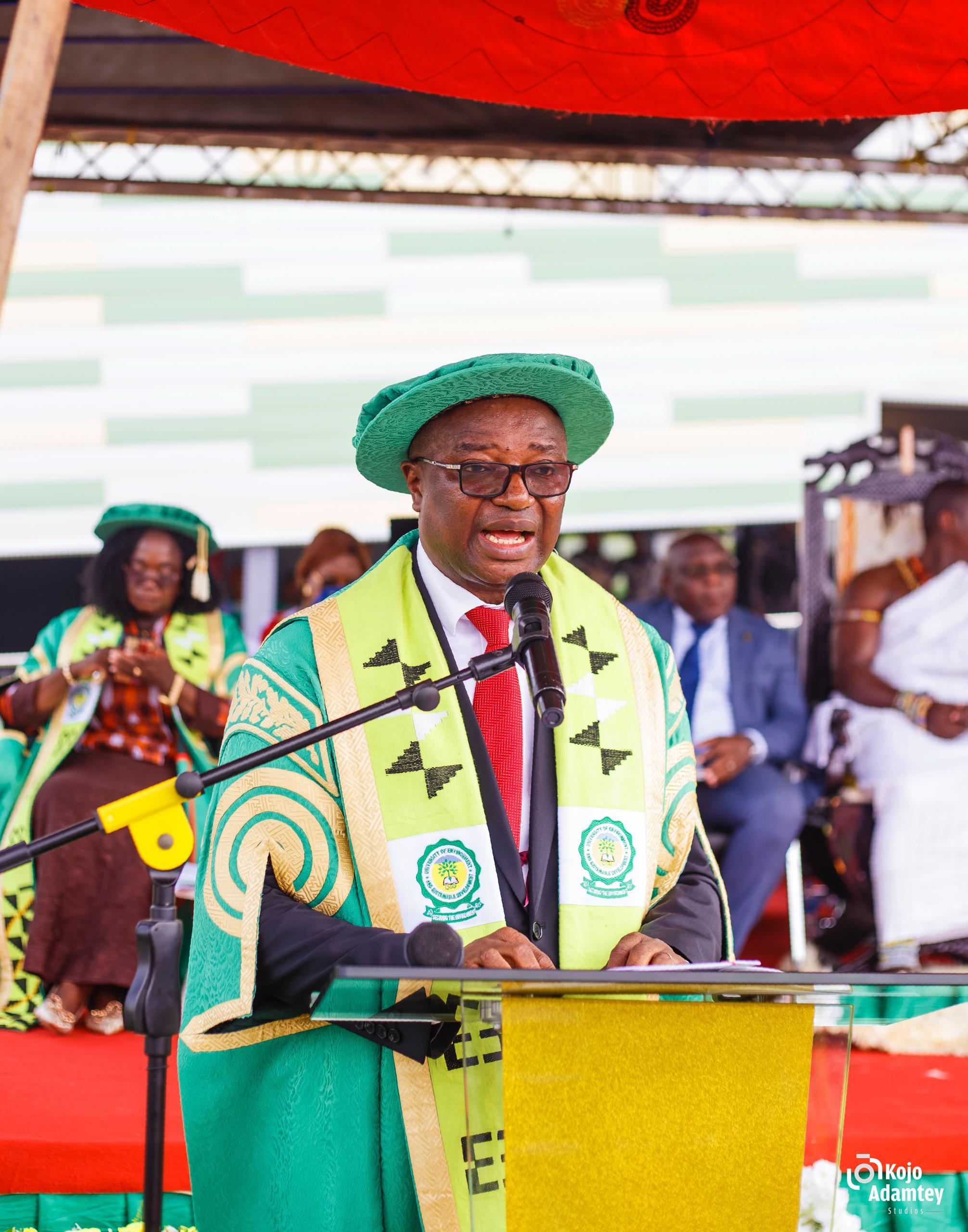The Vice-Chancellor of the University of Environment and Sustainable Development (UESD), Prof. Eric Nyarko-Sampson, has reminded the government of the seed money promised to the University during the commissioning and sod-cutting for Phase II of the University projects four years ago. He said, “Releasing the money would help the University to come out of the difficulties she finds herself in and acquire additional working tools.”
Prof. Eric Nyarko-Sampson was delivering his speech at the Maiden Congregation of the University, which had President Akufo-Addo as the Guest of Honour. It was also graced by other dignitaries, including the Minister of Education, Hon. Dr. Yaw Adutwum; the Eastern Regional Minister, Hon. Seth Kwame Acheampong; former Minister of Finance, Hon. Seth Terkper; members of the clergy; traditional rulers; representatives from the Ghana Tertiary Education Commission (GTEC); security forces; the Council Chairman, Prof. Jonathan Narh Ayertey; Council members; Convocation; as well as friends and families of the graduates.
The event was held on the theme: “Sustaining Our Future: Innovating for a Greener Tomorrow.” Eighty-six (86) students graduated, comprising 59 males and 27 females, with degrees from the School of Sustainable Development (SSD) and the School of Natural and Environmental Sciences (SNES). Eleven students graduated with First-Class Honours, and 39 earned Second-Class Upper.
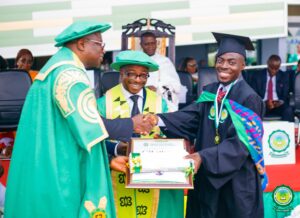
Maxwell Boakye, from the Department of Environment of Public Health of SNES, emerged as the Best Graduating Student with a perfect grade point average (GPA) of 4.0. He distinguished himself by winning 10 out of the 23 awards sponsored by various individuals and institutions. The Female Best Graduating Student Award with an impressive GPA of 3.85 was won by Portia Teye Korleki, who studied Energy Sustainability at SSD.
The Vice-Chancellor further lamented the stalled state of three critical GETFund projects: an Administration block (72% completed), an Auditorium block (85% completed), and a Lecture Hall/Library/ICT Laboratory block (35% completed). The delays he said, have compelled Management to repurpose lecture rooms into offices due to insufficient administrative spaces.
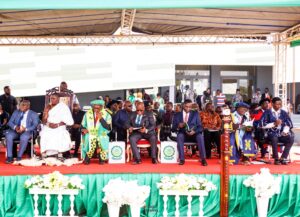
Also, there is also lack of residential accommodation for both staff and students. He revealed that only three key staff members currently have residential facilities on campus. Although the government is constructing a 440-bed facility, the Vice-Chancellor appealed for its timely completion to meet the rising demand. Prof. Nyarko-Sampson also raised inadequate transportation and appealed for additional vehicles.
Additionally, the Vice-Chancellor called for the resumption of Phase II of the Engineering, Procurement, and Construction (EPC) project, which includes a second Faculty block, another science laboratory, staff accommodation, recreational facilities, and asphalted roads. These projects have been stalled, primarily due to the Domestic Debt Exchange Programme (DDEP). The Vice-Chancellor stressed the urgency of completing at least the faculty block to ease the growing demand for lecture halls.
Strides: Prof. Nyarko-Sampson highlighted several milestones achieved by the University in its four years of existence. These include the development of a Five-Year Strategic Plan (2020-2025), the formulation of Statutes and guidelines for the appointment and promotion of senior members, and the creation of a Master Plan for the 312.29-acre Somanya campus. Additionally, the University collaborated with five other institutions to secure a grant of over seven million dollars from the Mastercard Foundation for a Nutrition and Agri-Food collaboration. It also obtained funding for the ImPreSSion project.
Faculty and staff have conducted groundbreaking research in sustainable agriculture, renewable energy, and waste management. Furthermore, the University’s management has established platforms enabling individuals, groups, and organizations to provide scholarships to students from underprivileged backgrounds, ensuring that education in environmental and sustainability studies remains accessible to all.
Addressing the graduates, he urged them to uphold the values and lessons instilled at UESD. He encouraged them to embrace leadership in environmental stewardship and sustainability while remaining curious, seeking knowledge, and acting decisively to build a greener future.
Council Chairman: Prof. Jonathan Narh Ayertey, who conferred the degrees on the graduates, congratulated them. He described the moment as a symbolic culmination of four years of dedication, perseverance, and growth, which was made possible through the unwavering support of the faculty and staff.
The Guest Speaker, Mr. Farouk Braimah, a motivational speaker, advocate for sustainable urban development, and campaigner with the Peoples Dialogue on Human Settlements, delivered an inspiring address to the graduates. He encouraged them to take pride in their roles as pioneers of the University. He called on them to be ambassadors of environmental sustainability and leaders in combating climate change, air pollution, and biodiversity loss.
Mr. Braimah highlighted pressing global challenges, particularly the triple planetary crisis of climate change, air pollution, and biodiversity loss. He stressed the urgency for graduates to apply their education to tackle these issues, especially as Ghana’s urban population grows and unsustainable practices increasingly affect the environment.
Drawing from his journey in social justice and environmental activism, Mr. Braimah shared formative experiences from his University days, including volunteering with organisations like the Salvation Army Mobile Health Outreach and Amnesty International. These experiences sparked his passion for serving marginalized communities and eventually led to his role as a Human Rights Officer at the Centre for Public Interest Law (CEPIL), where he used the law as a tool for social and environmental justice.
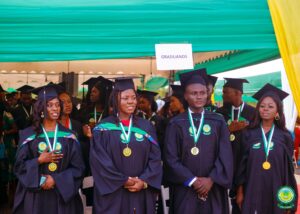
A notable highlight of his address was his encouragement for graduates to consider self-employment, particularly through establishing Non-Governmental Organisations (NGOs). He urged them to reflect on their passions, envision meaningful contributions, and be prepared to make sacrifices for their chosen causes. In his concluding remarks, Mr. Braimah challenged the graduates to view their degrees as launching pads rather than endpoints
In his valedictory speech, Mr. Boakye expressed excitement about his achievements and those of his colleagues. He conveyed his gratitude to the Management and staff of the University for their guidance throughout their academic journey.
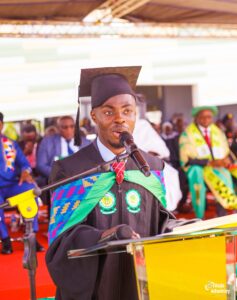
UESD anthem: The event featured the unveiling of the UESD anthem, performed by the UESD Choir and conducted by its composer, Mr. Godfred Teye Mensah Akuffo. Mr. Akuffo, an Assistant Lecturer in African Studies, is also a prominent chorister.
UESD Alumni Association: Vice-Chancellor, Prof. Nyarko-Sampson, also inaugurated the UESD Alumni Association during the ceremony. Graduates took the Alumni Oath, administered by the Registrar, marking the beginning of their lifelong connection to the University.
The ceremony also featured a performance by the Police Band and the UESD Choir.

